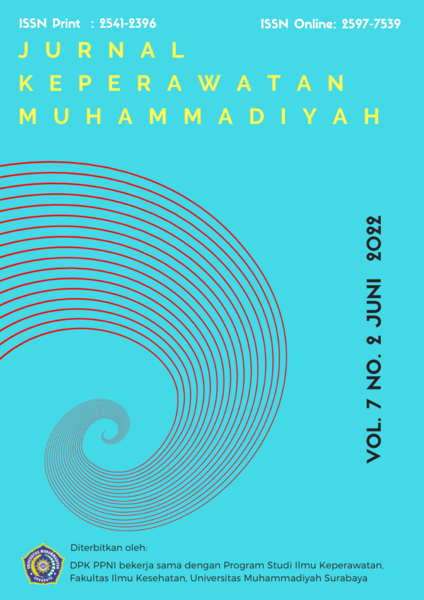Hubungan Caring Perawat Terhadap Tingkat Kepuasan Pasien Di Ruang Rawat Inap 1 Rumah Sakit Umum Haji Surabaya
DOI:
https://doi.org/10.30651/jkm.v7i2.14474Keywords:
Caring Nurses, and Patient Satisfaction Level.Abstract
Background: Caring for nurses is a caring attitude that makes it easier for patients to achieve improved health and recovery. Whether or not a patient is satisfied in assessing the quality of nursing services is very dependent on how a nurse applies caring tips when providing nursing services. Purpose: To describe the relationship between nurse caring and the level of patient satisfaction in inpatient room 1 of the Haji General Hospital, Surabaya. Methods: Quantitative research method by applying correlational method with Cross Sectional approach. The sample in this study was 30 patients who were in the inpatient room 1 RSU Haji Surabaya. Sampling using Non Probability Sampling with Simple Random Sampling sampling technique. The research instrument used a nurse caring questionnaire and the level of patient satisfaction. The research instrument used a nurse caring questionnaire and the level of patient satisfaction. Analysis of the data using the Chi-Square test with the help of SPSS 25. Results: The results of the analysis show that there is a significant relationship between nurse caring and the level of patient satisfaction in the inpatient room 1 Rsu Haji Surabaya (Ï value
= 0.01 <0.05) with a correlation value (0.598) then H0 is rejected so that Ha is accepted so there is a strong relationship and a positive relationship, the better the nurse's caring, the better the level of patient satisfaction, namely the respondent has the caring nature of the nurse 28 respondents (93%) and as many as 25 respondents (83%) have a good level of patient satisfaction. Conclusion: There is a relationship between the caring of nurses on the level of patient satisfaction in the inpatient room 1 of the Surabaya Haji General Hospital. Therefore, caring for nurses is very important in improving the quality of service in nursing, so the caring behavior of nurses needs to be improved. One way to improve caring behavior is to do in-house training. Innovation in house training is hard skill and soft skill training.
Keywords: Caring Nurses, and Patient Satisfaction Level.
Â
References
DAFTAR PUSTAKA
Abdul, Saleh, A., Sjattar, E., L. 2013. Jurnal Hubungan Perilaku Caring Perawat Dengan Tingkat Kepuasan Pasien Rawat Inap Di Rumah Sakit Bau- bau.
Bauk et al, (2013). Hubungan Karakteristik Pasien dengan Kualitas Pelayanan: Persepsi Pasien Pelayanan Rawat Inap RSUD Majene.
Dwidiyanti. 2015. Caring Kunci Sukses Perawatan Mengamalkan Ilmu. Semarang: Hasani
Edgar, 2020. Perilaku Caring Perawat Dengan Kepuasan Pasien. Jurnal Keperawatan. Volume 8 Nomor 1, ISSN 2302-1152:
Manado.
Firdauz, Z., dkk. 2010. Analisa Faktor yang Berhubungan dengan Kepuasan Pasien Rawat Inap di Rumah Sakit Islam Surakarta, FIK UMS.
Harahap, E. M. (2019). Hubungan Pelayanan Keperawatan dengan Kepuasan Pasien BPJS Di Rawat Inap Rumah Sakit Sundari Medan. Journal Of Nursing Update, Volume 1 Nomor 1, 2.
Ilkafah, & Harniah. (2017). Perilaku Caring Perawat Dengan
Kepuasan Pasien di Ruang Rawat Innapprivate Care Centre RSUP DR Wahidin Sudirohusodo Makassar, 8,
–146.
Kalsum. (2016). Hubungan Perilaku Caring Perawat dengan Kepuasan Pasien di Ruang Perawatan Teratai Rumah Sakit Umum Pusat Fatmawati. https://repository.uinjkt.ac.id/ dspace/bitstream/123456789/ 32964/1/UMI%20KALSUM-
FKIK. Pada Tanggal 8 November 2019.
Kusnanto. 2019. Perilaku Caring Perawat Profesional. Surabaya : Pusat Penerbitan Dan Percetakan Universitas Airlangga (AUP).
Kotler, P. 2016. Marketing Management: Analysis, Planning, Implementation And Control. New Jersey: Prentice Hall.
Laschinger, H. K. S, Gilbert S, & Smith L, (2011). Patient Satisfaction as a Nurse Sensitive Outcome. In D. M. Doran(Ed), Nursing Outcome: the state of the science (2nd ed. pp.359). London: Jones&Bartlett Learning.
Linda, dkk. 2017. Kepuasan pasien Terhadap Pelayanan Kesehatan.
Nursalam, 2014. Konsep Dan Penerapan Metodelogi Penelitian Ilmu Keperawatan. Edisi 2 Jakarta: Salemba Medika.
Nursalam. 2016. Manajemen Keperawatan :Aplikasi dalam
Praktik Keperawatan Profesional. Jakarta :Salemba Medika.
Potter & Perry. 2009. Fundamental of Nursing Fundamental keperawatan, Buku 1 edisi 7 Editor Dripa sjabana, Salemba Medika, Jakarta.
Potter & Perry, 2012. Buku Ajar Fundamental Keperawatan: Konsep, Proses Dan Praktek. Volume II. Jakarta: EGC. Potter & Perry, 2013. Buku Ajar Fundamental Keperawatan: Konsep, Proses Dan Praktek. Volume
II. Edisi Revisi. Jakarta: EGC.
Purwoastuti, 2015. Perilaku dan Softskills Kesehatan Panduan Untuk Tenaga Kesehatan (Perawat dan Bidan). Yogyakarta: Pustakabarupress
Prabowo, B.S., dkk 2014. Hubungan Tingkat Kognitif Perawat Tentang Caring Dengan Aplikasi Praktek Caring di Ruang Rawat Inap RSU dr. H. Koesnadi Bondowoso. e- Jurnal Pustaka Kesehatan, vol
(no 1.) Januari 2014.
Prompahakul C., dkk. 2011. Review: Factors Relating To Nurses' Caring Behaviors for Dying Patient. Nurse Media Journal Of Nursing.
Suweko&Warsito. (2019). Hubungan Perilaku Caring Perawat Dengan Kepuasan Pasien di Ruang Rawat Inap : Literatur Review. http://ejr.stikesmuhkudus.ac.i
d. Pada Tanggal 8 November 2019.
Umayah, E. P. (2017). Hubungan Perilaku Caring Perawat Dengan Tingkat Kepuasan Pasien Di Bangsal Rawat Inap Wardah RS Pku Muhammadiyah Gamping. Universitas Aisyiyah Yogyakarta.
Watson, J. 2004. Theory Of human caring.
Http://www2.uchsc.edu/son/c aring.
Wicaksono, D., Y., & Dian Prawesti. 2012. Kiat Keperawtan (Caring) dalam meningkatkan mutu asuhan keperawatan. Jurnal Stikes Vol 5, No. 2
Desember 2012.
Downloads
Published
Issue
Section
License
- Penulis tetap memegang hak atas karyanya dan memberikan hak publikasi pertama kepada jurnal ini yang secara simultan karya tersebut dilisensikan di bawah:Â Creative Commons Attribution-ShareAlike 4.0 International (CC BY-SA 4.0)













